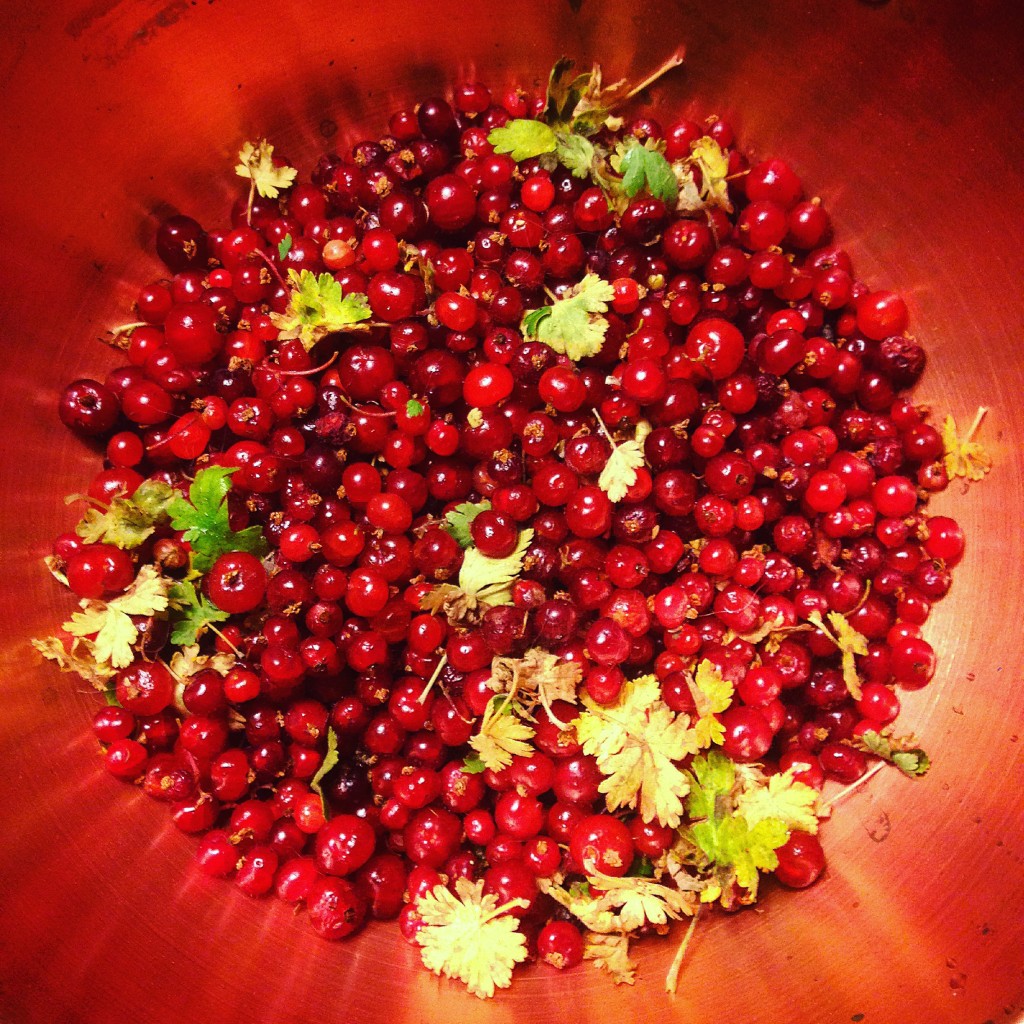
It had begun as an afternoon stroll, but within ten minutes it was decided that it would become a berry picking expedition. The contents of the only water bottle were emptied and it was conscripted into service for the mission. How grateful I was for the presence of the berries, though I would certainly have dressed myself differently had I known where I would wind up. I set out for a jaunt in sandals and a skirt and returned home with legs scratched and bloody from gooseberry thorns.
More than the fruits themselves I was grateful for the practice of picking them—my neurons firing when I registered the sight of the red globes—made even more poignant by the fact that there were so few. The drought had rendered the plants only viable when they sat on the bank of the creek, and so that’s where I kept myself and my dogs, close to the water, my bearbrain shooting lighting bright when we came upon a harvestable bush. So fortunate are we when we are able to put to use our gift of recognizing these patterns in nature. First find this—these particular leaves, fanned out and quarter-sized and low to the ground, hovering. Sometimes they are bright yellow now in mid-September and sometimes they are still green. It didn’t seem to matter whether they were losing their chlorophyll or not when it came to the presence of the ripe fruit. Then, look closer, underneath, is there red ? Am I certain it isn’t the fall flush of some ground shrub? How far away—close enough to justify trudging uphill in sandals? How many points of color do I see? Enough to make the trip worth it?
It occurred to me that I worked with the mindset of an apex predator. I looked up very rarely. I thought of the deer, when we hunted them, when I sat on the hill with binoculars and watched them in the hot sun for hours. Eat, look up, eat, look up. Sleep, wake, look again, smell the air, doze with one eye open. Never settled even when nestled in their hiding places. Always cautious, waiting for the shot from afar, the teeth from above. I on the other hand was close to oblivious of any dangers posed to me as I worked, though I thought for a few moments about the night in Echo Valley when I took off my backpack, bent down to tie my shoes, felt a shiver run across my spine and rose quickly to my feet, slinging the barrier that would protect the back of my neck up and onto my shoulders in a fluid motion. And then I half-ran uphill, looking behind me, truly afraid, down in the base of my skull.
This is not a feeling we are fortunate enough to experience, most of us. Though we still look up when a shadow passes overhead, it has been a long time since eagles stole our children to pull out their eyeballs and leave the distinctive marks that anthropologists would later identify. But we still flinch at the shadows. I found that to be a beautiful thought. But in this familiar forest, with my animals as my protectors, I was unabashedly unafraid. I worked with my head down, aware mostly of my being unaware. Hikers would pass me on the other side of the creek and I did not register their presence until I heard their voices or their missteps. The dogs looped and weaved around me and I barely noticed their trajectories. The young one would streak past, so fast so fast so fast, and the old one trudged along, his breathing labored.
I relished in the activity—foraging, I thought, being one of our greatest joys and one we are so rarely able to exercise. Instead we choose Ambien and Restless Leg Syndrome and visits with The Therapist. I recall the hunting of the morels after the Great Fire and their shape, their glorious shape, becoming apparent to me once my eyes unfocused slightly and cued in on that honeycombed silhouette in the duff. I saw them behind my eyelids when I closed them to sleep that month, so great were their numbers, and so focused was I on seeing them. They were miraculous—fanning forward as my gaze lifted from blackened, crawling hands to the whole carpeted floor of the forest before me, rolling swales of burned Ponderosa pines and dewy new moss, and the tightly-clustered skeletons of aspens which died together, entwined like the lovers of Pompeii. How I loved those days that spring, the bitter rewards of the fire that took so much. They reminded me that life gives freely, but that life also covets life, and that the sweet beauty of these sparrow-brown mushrooms dancing in butter in my cast iron skillet was the devil’s bargain we struck for the loss of of our forest, and that it was not up to me to decide whether it was worth it—it simply was.
And so this day, laughing in the face of the low-growling drought that kept me hemmed in with smoke from these new fires, these fires whose dragon-breath rolled over the mountains each afternoon to trap us, I kneeled in the middle of bushes armed with teeth, releasing the precious red orbs from their thorny castles into my dented water bottle. And I didn’t think—at least not much, blessedly, about the emptiness in my belly, about the words that played themselves over and over in my head as I tried to sleep, about everything that I have ever done wrong, every misstep I have ever made, every enemy I have created, every time I refused to forgive. I only looked, and picked, and stepped, and looked, and picked, and stepped.
My fingers grasped the berries, glossy and slightly translucent, and my brain registered with pleasure the sensation of a firm, ripe specimen—satisfaction that i had made the right choice. Drop it in the bottle, move along, methodically, working from one end of the bush to the other, conserving effort, grasping with three fingers and pulling firmly to release several at a time if I were lucky enough to find such a rare occurrence. Sometimes my brain would register yes, red, and tell my fingers to grasp, and they would be met with the disappointing sensation of a dried husk. I ruminated on the fact that my senses had led me astray, had not discerned the true, darker color of this fruit that could not feed me, and allowed me to waste my energy in trying to separate if from its bush. Sometimes, even worse, my bumbling fingers would grasp a perfect little globe and let it slip, into the detritus on the ground, into the river, and I would curse my humanness, my soft digits for not wanting to delve deeply into the bush in fear of being pierced by the mild kiss of the tiny thorns.
And I do curse my humanness, most often when I am allowed to slip back into this part of my brain, the part that senses without description the pure joy of finding sustenance in nature. I curse the weak limbs that cannot propel me forward the way the young dog’s do. When I see him fly, his legs lifting off the ground with the unbridled joy of being, and running, I despise the heavy clubs attached to my torso that take so much cajoling to move quickly through the forest—they are earthbound, clumsy. I curse my sense of smell, that talent we lost so long ago when we joined forces with the wolf, who was better, who cultivated his talent while we let ours wane, content to strategize and perform feats of mathematics.
As I leaned down to inspect another new cluster of fruit I smelled the beginning of the rain. I had been hearing the thunder for about an hour, and I sighed with relief that at least I could still detect this. It was not the smell of petrichor—the water had not yet hit the earth—it was the smell of the cool and dry wind that is the harbinger of a coming storm as it sweeps down the creek bed, which tumbles down the canyon, leaving the high country from whence it came. I thought of my hastiness in decrying my piteous sense of smell and felt a pang of gratitude that I still had the capacities I did, though we are certainly blundering when compared to the deer, who leap to their feet and flee once the thread of a human scent comes their way, and when paired against the pigs who smelled us before we even crested the hill from which we saw them, already running. The wind, the wind, the wind carried our evidence to them and now carried the evidence of the rainstorm to me. I smiled, and stood still and inhaled, and tongued the feeling of being not-so-far-removed.
I thought of the smell of the sow as we opened her belly, and how it was the same as the smell of the sweet, curled, soft dead buck that we loaded into the back of my truck. I thought of how they smelled like the blood of the middle dog when his foot was opened wide by a truck’s tire, and how when I raced him to the doctor a drop of blood flew forward onto my windshield, where it remains, in the center, browned and cracking and almost-gone. And as I drove that day, my fingers gripping the steering wheel, I realized that he smelled like those dead animals, like just-blood. And I thought of how we ate the pig, and how we were desperately trying to save the dog, and how if it were me bleeding in the back of the truck my blood would smell just like that, and how we are all of us the same.
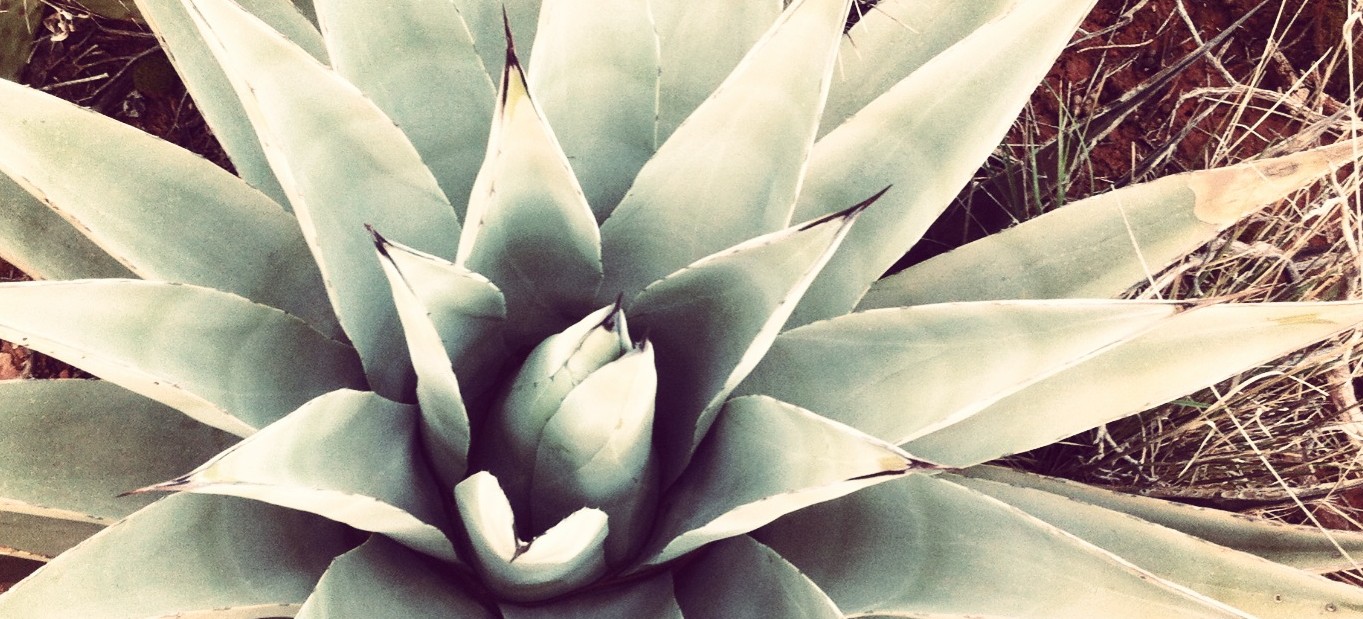

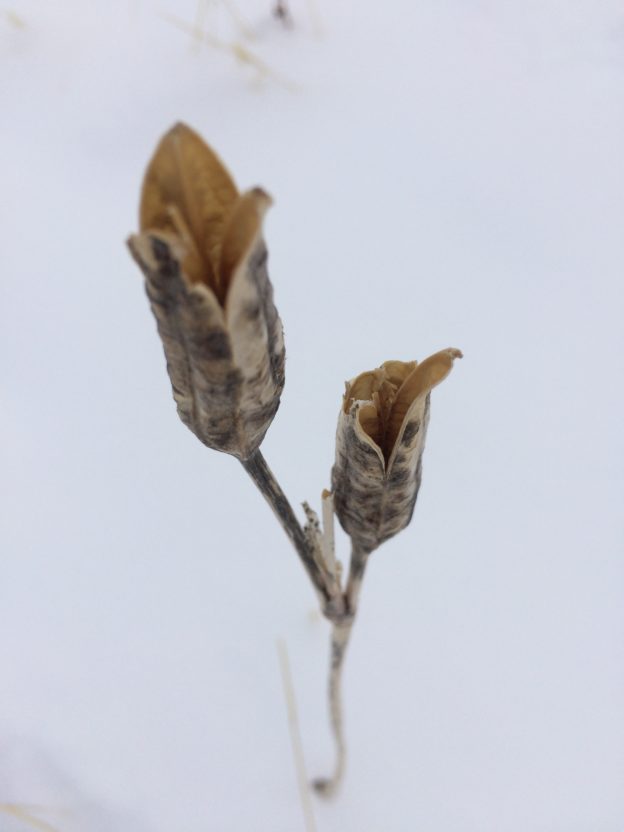
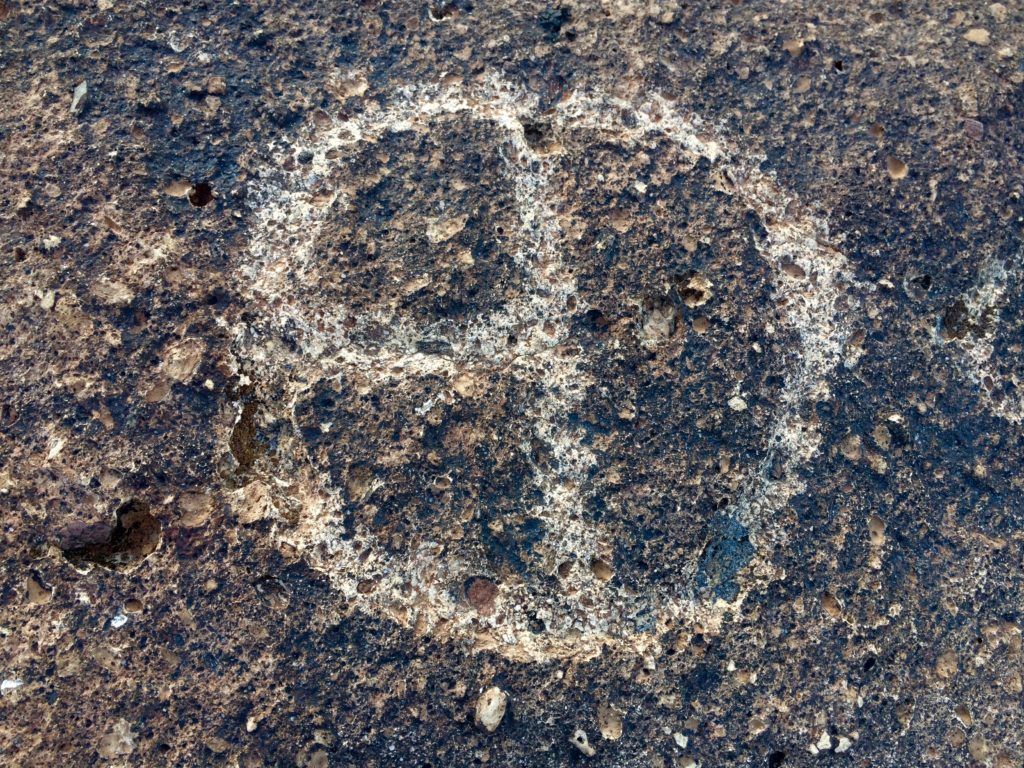


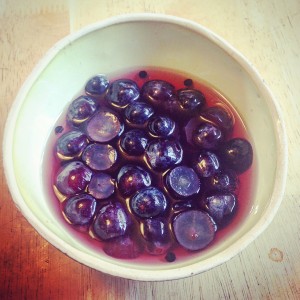
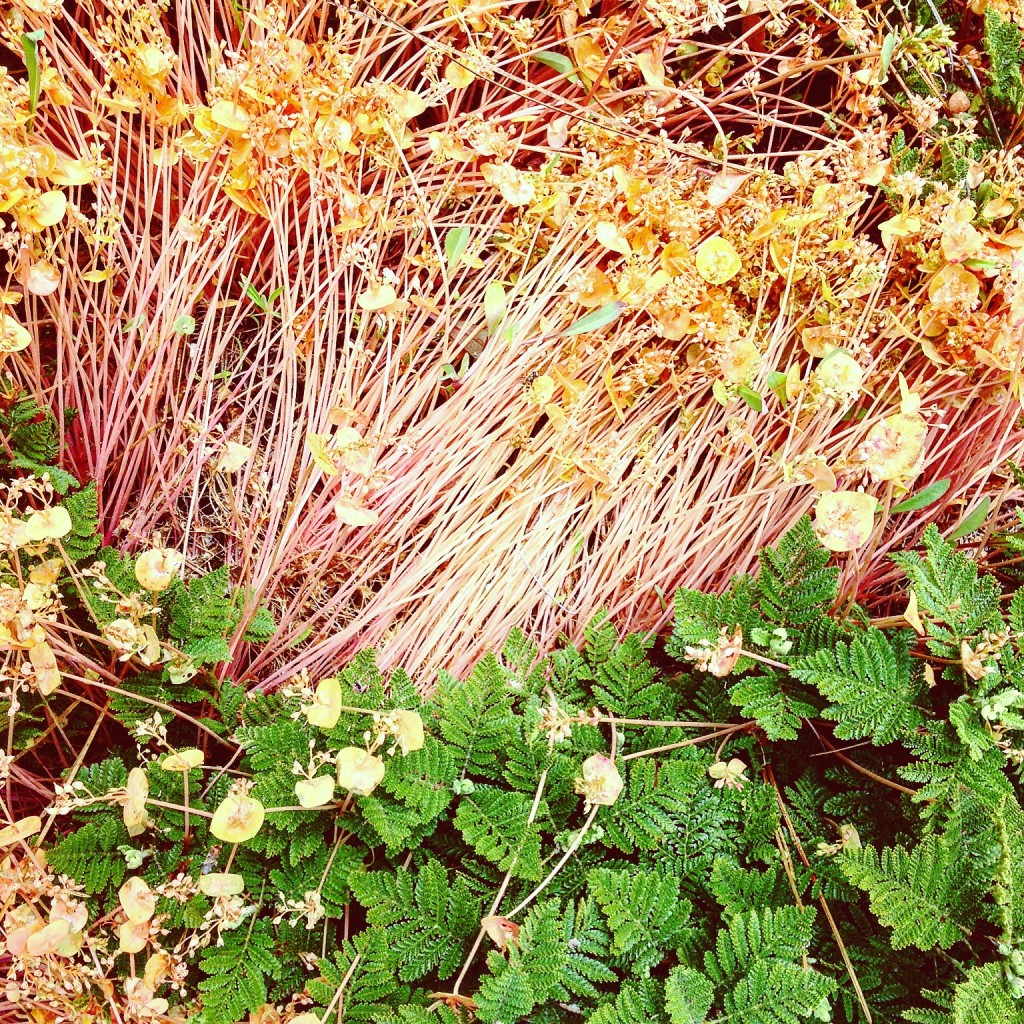
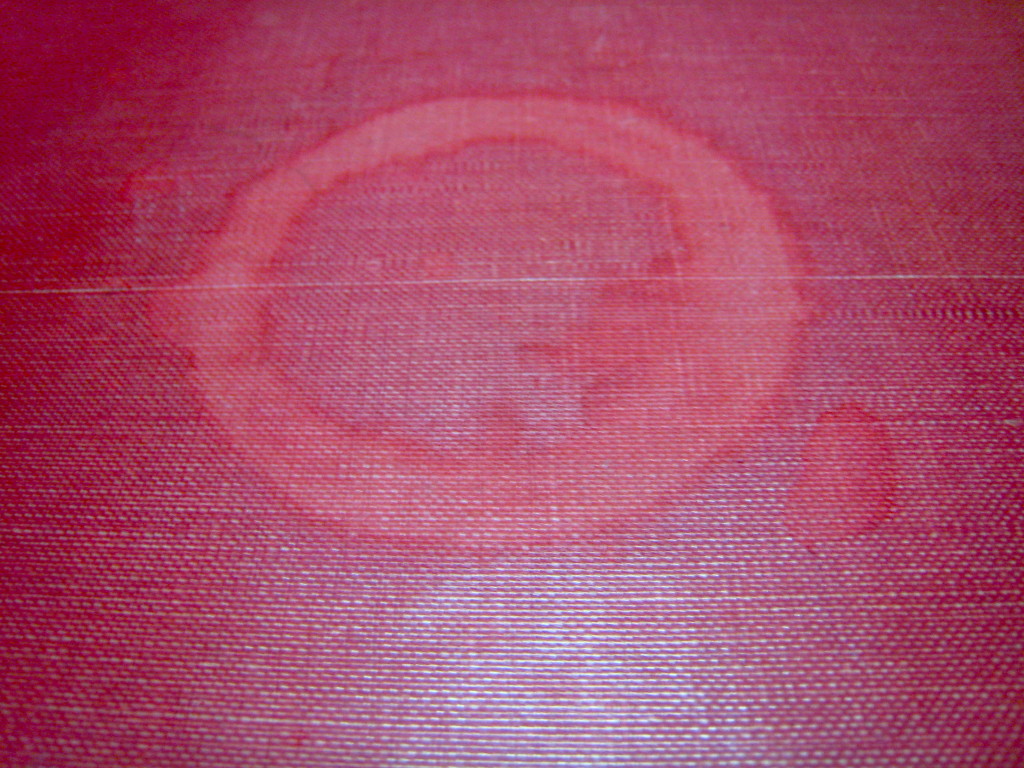
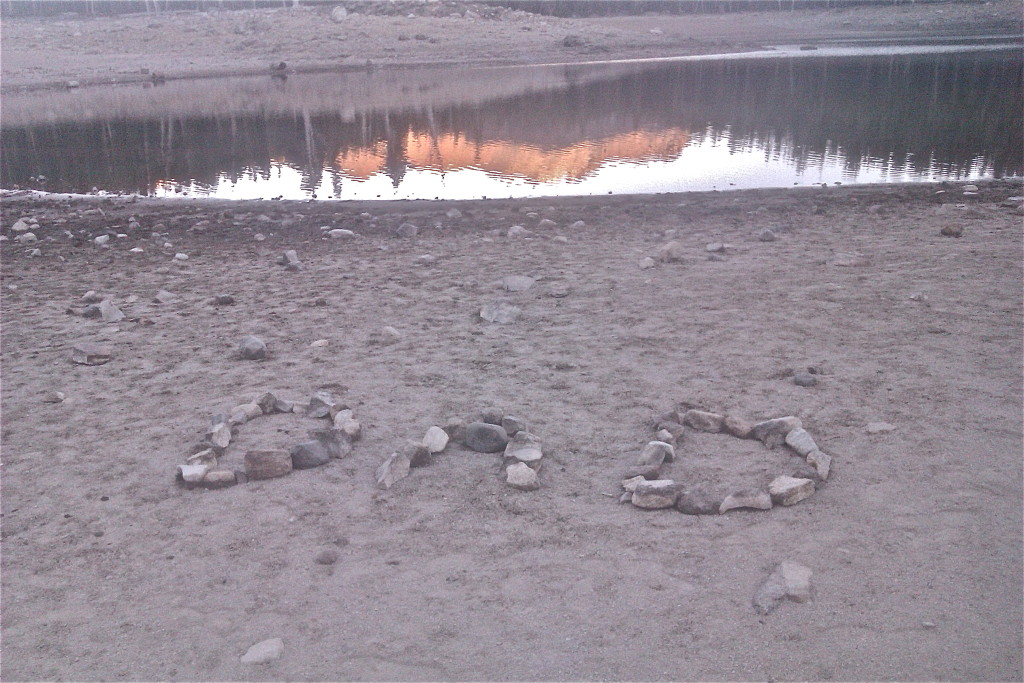
![IMG_0556[1]](http://www.copperandcoal.com/wp-content/uploads/2014/12/IMG_05561-1024x768.jpg)